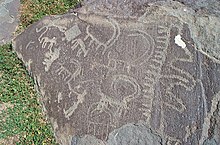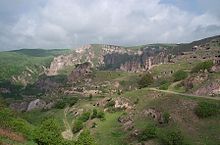Southern Armenia Life —

SOUTHERN PART OF ARMENIA —
Southern Armenia is in Armenia. Southern Armenia is full of tall mountain ranges, valleys, gorges and forests. One main highway takes you from top to bottom, with dramatic changes in elevation and scenery. The many types of attractions include hot springs and spas, dramatic cliffs and scenery, monasteries, caravansarys and fortresses, petroglyphs and Armenia's "Stonehenge", natural caves and cave cities, and Armenia's favorite wine region.
Regions
Tatev MonasterySouthern Armenia is defined here as Syunik Province (the southernmost) and Vayots Dzor Province.
Cities
From north to south:
- 1 Areni — a big center for wine production in Armenia
- 2 Yeghegnadzor — a small town close to spectacular canyon and monastery in Noravank, the impressive Smbatabert Fortress/Tsakhats Kar Monastery area and the old silk road caravanserai of Selim
- 3 Jermuk — a spa town where much of the country's mineral water comes from
- 4 Sisian — a good base for visiting Ughtasar mountain and thousands of petroglyphs on top of it
- 5 Goris — the last major town in Armenia for travelers continuing to Karabakh and also entering point to Tatev
- 6 Tatev — it is famous for its monastery and reached by the longest cable car of the world, called Wings of Tatev
- 7 Tandzaver — the first land-art museum in Armenia
- 8 Kapan — not the most interesting town, but Vahanavank Monastery is nearby
- 9 Meghri — the crossing point into Iran
Understand
Most visitors do not venture past Goris and Tatev, so the very south is almost wholly undiscovered. Goris is the last town on the highway leading to Karabakh, so many visitors just pass through and don't enjoy what the area has to offer.This whole part of the world is known for its hospitality, and the parts of Southern Armenia which see few tourists are even more so than others. Venture into a village for directions, and you can find yourself at the receiving end of a feast, homemade fruit oghi (vodka) being drunk and them making you spend the night. Refusing hospitality is often challenging, but don't bother as the experiences are sure to be memorable.
There is one main highway going through this region, which leads to Iran at the southern end. You'll see Iranian trucks coming and going, as well as a decent number of barbecue restaurants along the highway.
Talk
Aside from the universally spoken Eastern Armenian, Russian is almost universally spoken. English, French and German are languages that many have studied in school, but few have had a chance to practice. The youth are your best bet for English proficiency. Most signs are in Armenian and often in English and Russian as well.
Almost all of Southern Armenia's visitors drive down the highway from Yerevan. You can also enter from the Lake Sevan Region, or from Iran. Depending on your budget and your plans, you can enter by tour van, private taxi/van, shared taxi, rent a car, or take public transport - either a bus or a van (marshutni) that's heading to or past a town you want to get to. You can also try hitching. It's not as popular as it used to be, but it's still perfectly acceptable, although unaccompanied women might find themselves getting more attention than they'd like. The only major town not on the North-South highway is Jermuk, so catching a bus or van going directly there is your best bet, unless you really do want to hitchhike or try and find a taxi in one of the towns along the highway. Public transport is cheap, and often crowded. Have some smaller change on you and ask a fellow passenger the fare to have it ready.
Get around
Most tourists arrive in Southern Armenia on a tour van. You can also arrange a private tour with guide with most companies, or just negotiate with taxi drivers in Yerevan to take you around. A taxi might be cheaper than renting a car, and easier than driving one.Getting around in the South can be tough with public transportation, unless you're sticking to the main highway. From there, taxis or hitching are your best bets. On the main highway, buses and vans are frequent, and as long as they're heading in the right direction (north/south) it's tough to go wrong.
If you're not depending on public transport, just have wherever you are staying arrange a cab for you for the day. Taxis are reasonably priced in Armenia and usually cost 100 dram/km. There are no car rental agencies in the south, although you can rent a car in Yerevan and drive down.
- Noravank Monastery - Surrounded by brick red cliffs, and the famous church on top of a church design, Noravank is one of Armenia's most popular attractions. Access to the second story church is by rock steps jutting out of the facade. There are many intricate carvings on the churches and in the khachkars on the grounds.
- Tatev Monastery - Notable even in a country known for stunning landscapes and architecture. The massive monastery complex is a continuation of a sheer cliff that drops below it for hundreds of meters. Once the seat of great wealth, this monastery controlled much of the surrounding countryside. It saw invasions, peasant rebellions and earthquakes. A severe earthquake in the 20th century caused great damage that was partially fixed during Soviet times. Now, it's still a spectacular site accessible by a long, bad road, which deters many visitors. At the foot of the cliffs you'll find Satan's Bridge (see below)
- Satan's Bridge - At the foot of a sheer canyon with a river running along the bottom, this natural land bridge is called Satan's Bridge (Satanayi Kamurj) by locals. It has a carbonated spring, that you can drink from, along the side of the road, and if you go down a short trail you can swim in a spring fed pool. A tough climb down below the land bridge will reward you with stalactites, stalagmites, and little pools in a cavernous tunnel. Plenty of space around to camp and picnic.

- Ughtasar Petroglyphs - The spectacular site is a valley with a lake, surrounded by mountain peaks on most sides. The valley is littered with massive boulders, some of which have one, two or even dozens of petroglyphs on them, totaling in the thousands, aged from the 5th to 2nd century BC. Patches of snow are found year round, and nights are very cold even in August. The site is only accessible in July-September, as it is above 4,000 meters in elevation. A visit to the remote, mountaintop site of the Ughtasar petroglyphs is a full day proposition. It is better to start the day in the area, rather than from Yerevan, since starting in Yerevan adds 5 hours (roundtrip) to an already very long trip (4-5 hours roundtrip not counting the time you spend at the site).
- Selim Caravansary - A few meters from the top of a windy mountain pass leading to Lake Sevan, this old stop on the Silk Road affords spectacular views, and a feel for what it was like for the caravans in the old days.

- Old Khndzoresk - A small cave city that was inhabited until the 1960s, Old Khdzoresk is in a beautiful, lush canyon below New Khndzoresk. The rock formations, ruins, and of course many caves which have be carved out by people over the centuries are fun to explore. Enjoy the blackberries and avoid the stinging nettles!
- Shikahogh Reserve - One of Armenia's most pristine areas, Shikahogh now has the main north-south highway passing through it. But the forests are still beautiful, the wildlife plentiful, the views of Iran from the crests of the southern mountain range awesome, and Mtnadzor (Canyon of Darkness) is still completely wild and untouched.
- Zorats Karer - Armenia's answer to Stonehenge, only thousands of years older. These standing rocks, a much cruder version of Stonehenge are also called Karahunj, and with kara meaning "of stone" in Armenian, the similarity in names suddenly becomes inexplicable. Just off the highway, it's a fun spot to stop and try and make out the patterns of the stones, and peek through the holes many of them have, perhaps for astrological observation? The massive stones in the centers of the circle are very ancient burial sites.
- Areni Wine Country - Armenia is where the grape vine originated, with more varieties of wild grape vines than anywhere else in the world as proof. Areni is an ancient grape growing region, and the Areni grape sort, not found anywhere else in the world, is their speciality. Visit some of the wineries that are open for tourists.

- Tsakhats Kar Monastery - Up in the mountains is the Monastery of Tsakhats Kar. A nice hike from the village below, or an offroad drive for those with a serious 4x4. Time seems to have forgotten this place, but you need not. It's across from Smbataberd (see below), and together they make a great outing.

- Smbataberd Fortress - A serious natural fortification with a serious fortress on top. This narrow sheer cape is capped with one of Armenia's biggest fortresses. The views of the valley's are impressive and the sheer drop a bit scary. Impossible to imagine this fortress ever being taken by force.
- Mozrov and Arjeri Caves - These rough caves, found very close to one another, were mapped during Soviet times, but there are no markers, no lights, no facilities, no decent road to them. Not many people know them well either, so finding a guide may be tough, but definitely necessary. Mozrov is only 700m long, but has the nicer formations. Arjeri cave, meaning bears cave, is a very extensive cave system, with some good formations, small pools of water, and both have bats.
Other sites
Smaller sites if you have the time or are in the area.
- Aghudi Memorial
- Arates Monastery
- Gndevank Monastery
- S. Sion Monastery
- Spitakavor Monastery
- Kotrats Caravansaray
- Gladzor University ruins
- Baghaberd Fortress
- Zorats Church
- Hike - There's limitless great hiking in the whole area. From Sisian to Tatev (not on the highway), from Tatev to Kapan on the backroads, around Shikahogh Reserve, all around Yeghegnadzor, Noravank Canyon, in the Smbataberd-Arates-S. Sion valleys, and elsewhere. This includes sections of the Transcaucasian Trail.
- Bike - Biking is a good way to get around the backroads of the region, and highways if you don't mind sharing the road with cars. The Tatev - Kapan backroad is a great one, and so is the area from Yeghegis to Herher.
- Hotsprings/Spa - Visit the spa town of Jermuk, where much of the country's mineral water comes from. The town is full of Soviet hotels and sanatoriums, some of which have been renovated to high standards. The countryside at this very high elevation resort is worth the visit as well, with canyons, forest and wildlife to explore.
Eat
The main highway is sprinkled with barbecue places. Few have menus, although prices are usually reasonable and asking avoid any potential for problems in the end. The menus consist of barbecued chunks of meat (khorovats), kebabs, and whole vegetables with pig fat. Strained yogurt, olives, greens and lavash are also normally brought to the table.
For anything close to fast food outside the main towns you usually have to go to a grocery store for the ingredients to make a sandwich.



